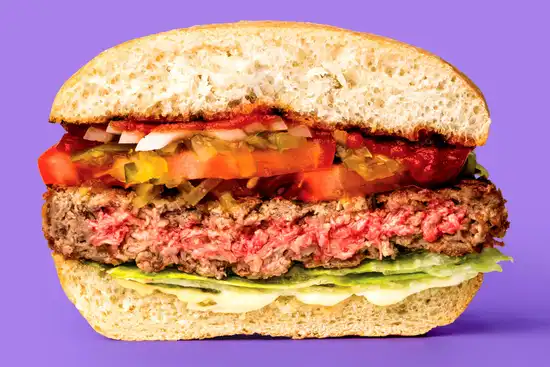Why Beef Is Bad for You- Vegan
How Healthy Are the New Constitute-Based 'Fake Meats'?

HealthDay Reporter
THURSDAY, June 17, 2021 (HealthDay News) -- More and more than Americans are seeking out healthier, greener and more than ethical alternatives to meat, just are plant-based alternatives like the Impossible Burger and Beyond Meat truly nutritious substitutes?
The answer is yeah, according to new enquiry funded by the U.S. National Institutes of Health. It plant the imitation meats to be a expert source of cobweb, folate and fe while containing less saturated fat than ground beef. Simply the researchers said they too have less protein, zinc and vitamin B12 — and lots of salt.
"Switching from ground beef to a institute-based ground beef alternative product tin be a healthy pick in some means," said lead researcher Lisa Harnack, of the University of Minnesota School of Public Health, in Minneapolis.
Her advice: Read the Nutrition Facts label and choose a product that best matches your wellness and diet goals.
For instance, if y'all're limiting sodium to control high blood pressure, steer articulate of products that are high in table salt, Harnack said.
"If y'all're watching saturated fat intake for center health, read the label to make sure you're choosing a product that is low in saturated fat," she said. "A few products comprise as much or about equally much saturated fatty equally basis beef."
For the report, Harnack's team used a Academy of Minnesota nutrient and nutrient database that includes 37 establish-based ground beef alternative products fabricated past ix food companies.
The products analyzed are from Amy's Kitchen, Inc.; Beyond Meat; Conagra, Inc.; Impossible Foods Inc.; Kellogg NA Co.; Kraft Foods, Inc.; Marlow Foods Ltd.; Tofurky; and Worthington.
Although these constitute-based products can exist salubrious alternatives to beef, Harnack hopes their manufacturers will brand them even healthier by keeping table salt to a minimum.
"Food companies should work to optimize the nutritional quality of their products, especially with respect to the amount of salt and other sodium-containing ingredients used in formulating veggie burgers and other plant-based basis beef alternative products," Harnack said.
Samantha Heller, a senior clinical nutritionist at NYU Langone Health in New York City, reviewed the findings.
She noted that the World Health Organisation has classified processed meats (deli meats, bacon and sausage) every bit potentially cancer-causing, and blood-red meat (veal, lamb, beef and pork) every bit probable cancer-causing substances, due to the processing, compounds in the meat and cooking methods.
"Limiting consumption of carmine and candy meats significantly lowers one'due south intake of saturated fatty," Heller said.
The sodium in some constitute-based simulated meats may be moderate to loftier, but if virtually of the foods people eat are less-candy ones, information technology should not be a problem, she added.
"All in all, eating more plants and fewer animals is proficient for your health and the health of the planet," Heller said.
Merely "meat alternative" is not an ideal term, she added, considering information technology sets upwardly expectations of gustatory modality.
"While some found-based 'meats' come shut to the taste and texture of real meat, the idea is that these foods offer a different choice for poly peptide, not a i-on-one swap out for meat or other fauna foods," Heller explained.
Many options exist for those seeking a more plant-based nutrition, she said.
"Whole foods are all-time, merely in that location is plenty of jerk room to include plant-based meat, dairy, poultry and egg alternatives," Heller advised. "On a daily basis if we consume a balanced, more plant-rich diet, we should exist able to run across our food needs."
The findings were published June 15 in the Journal of the Academy of Diet and Dietetics.
More information
For more on constitute-based diets, head to the Physicians Committee for Responsible Medicine.
SOURCES: Lisa Harnack, DrPH, RD, MPH, professor, partitioning of epidemiology and community wellness, University of Minnesota School of Public Wellness, Minneapolis; Samantha Heller MS, RD, CDN, senior clinical nutritionist, NYU Langone Health, New York Metropolis; J ournal of the Academy of Nutrition and Dietetics, June 15, 2021
Source: https://www.webmd.com/diet/news/20210617/how-healthy-are-the-new-plant-based-fake-meats
0 Response to "Why Beef Is Bad for You- Vegan"
Enregistrer un commentaire